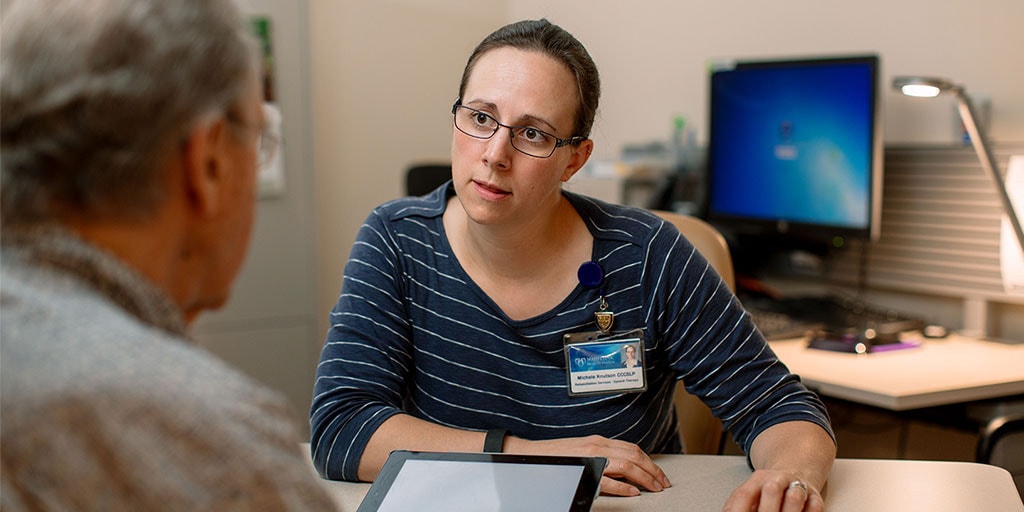Learn How a Speech Pathologist Helps People with Vocal Issues
Learn How a Speech Pathologist Helps People with Vocal Issues
Blog Article
How a Speech Pathologist Can Help Improve Communication Skills
Effective communication is a cornerstone of personal and professional success, yet many people encounter obstacles that prevent their capacity to share themselves plainly. A speech pathologist is furnished to attend to these barriers with targeted assessment and intervention strategies customized per person's requirements. By utilizing evidence-based therapeutic techniques, they not just function to enhance speech and language conditions but also boost general communicative skills. Comprehending the multifaceted duty of a speech pathologist discloses exactly how their knowledge can transform lives, welcoming a better evaluation of the specific approaches and results connected with their practice.
Recognizing Communication Problems
Comprehending interaction conditions is essential for acknowledging how they affect people' capability to share themselves and engage with others. Interaction disorders include a wide variety of troubles that impact speech, language, and social communication, frequently preventing effective communication. These problems can arise from different variables, including neurological problems, developing delays, physical disabilities, or psychological issues.
Speech conditions may materialize as troubles in articulation, fluency, or voice manufacturing, influencing how words are noticable or talked. Language problems, on the other hand, involve difficulties in understanding or making use of language, which can restrain both verbal and non-verbal communication. Social communication conditions are identified by troubles in the pragmatic aspects of communication, such as taking kip down discussion or understanding social signs.
The consequences of communication disorders are profound, affecting not only the person's capability to share feelings and ideas yet additionally their social partnerships, educational possibilities, and overall lifestyle. Awareness of these disorders can foster empathy and support, urging reliable strategies for interaction and involvement. Recognizing the intricacies of interaction conditions is a critical action in the direction of advertising inclusivity and attending to the requirements of those affected.
Role of a Speech Pathologist
Speech pathologists frequently play a vital duty in treating and diagnosing interaction problems, utilizing a range of evidence-based techniques customized to every individual's needs. These specialists deal with individuals across the life-span, from kids with speech delays to grownups recouping from strokes or distressing brain injuries. Their proficiency incorporates a range of communication issues, consisting of articulation, fluency, language, and voice problems.
In restorative settings, speech pathologists use structured treatments developed to enhance interaction skills. They might execute approaches such as speech exercises, language video games, and social communication training to facilitate enhancements in responsive and expressive language capacities. Speech Pathologist. Furthermore, they enlighten clients and their family members about reliable communication methods and flexible techniques to browse everyday communications
Beyond straight therapy, speech pathologists team up with other health care instructors, caregivers, and experts to ensure a comprehensive method to therapy. They advocate for clients by giving resources and assistance, allowing people to attain their communication goals and enhance their general lifestyle. As experts in the field, speech pathologists are necessary in cultivating effective communication, promoting self-reliance, and improving social involvement for those with communication challenges.
Evaluation and Diagnosis Process
The evaluation and medical diagnosis procedure performed by speech pathologists typically involves an extensive assessment to determine communication conditions precisely. This process begins with a comprehensive medical history, where the clinician gathers relevant information about the individual's medical, instructional, and developing history. Comprehending the context of the individual's communication difficulties is important for an accurate medical diagnosis.
Adhering to the medical history, speech pathologists use standardized tests and casual evaluations to examine different aspects of interaction, consisting of speech noise production, language understanding, meaningful language, and social communication abilities. These analyses are tailored to the individual's age and details worries, offering valuable information for analysis.
Observation is additionally an important element of the assessment procedure, as it allows the medical professional to see firsthand just how the private communicates in all-natural settings. In addition, interviews with relative and teachers can give insight right into the individual's interaction challenges throughout different settings.
Once the analysis is total, the speech pathologist manufactures the findings to determine a diagnosis and advise suitable treatments. This extensive analysis process makes certain that individuals get targeted support tailored to their one-of-a-kind communication requirements, laying the structure for efficient healing techniques.
Restorative Strategies and Techniques
Countless therapeutic methods and approaches are employed by speech pathologists to attend to a selection of communication conditions successfully. One widely made use of approach is expression therapy, which concentrates on dealing with speech sounds through rep and aesthetic cues. This method is specifically advantageous for individuals with speech audio problems.
An additional effective technique is language intervention, which improves both expressive and receptive language skills. This may include interactive activities that advertise vocabulary advancement, syntax understanding, and conversational abilities. In addition, speech pathologists frequently use social skills click over here now training to improve pragmatic language capabilities, allowing individuals to navigate social interactions much more effectively.
Fluency shaping and stuttering adjustment methods are particularly created to help those experiencing fluency conditions. These techniques assist clients establish smoother speech patterns and manage the physical and emotional components of stuttering.
Furthermore, alternative and augmentative communication (AAC) systems are used for people with extreme communication impairments. These systems, which can include motions, icons, or digital gadgets, offer vital support for effective interaction.
Benefits of Speech Therapy

In addition, speech treatment can help in developing important listening and comprehension abilities, cultivating much better interaction in conversations. People with cognitive-communication problems can likewise benefit, as treatment concentrates on enhancing memory and problem-solving abilities, essential for reliable site here interaction.
One more critical facet is the psychological support provided throughout therapy sessions. Speech pathologists create a secure atmosphere, encouraging people to get over stress and anxiety and aggravation related to their interaction issues. This assistance can cause improved self-worth and overall psychological wellness.
Moreover, early intervention through speech treatment can prevent more issues, making certain that individuals reach their full communicative capacity. Generally, the benefits of speech treatment extend past mere speech renovation, positively affecting various dimensions of life for those influenced by communication troubles.
Conclusion
In recap, speech pathologists play an essential duty in addressing interaction problems through evaluation, medical diagnosis, and tailored restorative treatments. By employing evidence-based methods, these specialists improve people' speech and language capabilities, promoting boosted clarity, fluency, and social interaction abilities. The advantages of very early intervention underscore the value of looking for assistance from speech pathologists, as their expertise can substantially boost communicative possibility, ultimately resulting in higher success in both individual and specialist spheres.

Speech pathologists regularly play an important function in detecting and treating communication conditions, using a range of evidence-based techniques customized to each person's needs. As experts in the area, speech pathologists are crucial in fostering efficient interaction, advertising independence, and enhancing social involvement for those with interaction obstacles.

Report this page